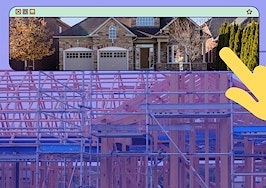In a shifting real estate market, the guidance and expertise that Inman imparts is never more valuable. Whether at our events, or with our daily news coverage and how-to journalism, we’re here to help you build your business, adopt the right tools — and make money. Join us in person in Las Vegas at Connect, and utilize your Select subscription for all the information you need to make the right decisions. When the waters get choppy, trust Inman to help you navigate.
Are you receiving Inman’s Agent Edge? Make sure you’re subscribed here.
Zillow is making moves with digital floor plans, launching a new feature that consumers are sure to love. The problem? Tackling how to manage data from a variety of sources to make sure the valuations they are creating are accurate.
The good news for American homeowners is that they have accrued more equity today than ever before. In fact, 39.5 percent of mortgaged residential properties nationwide were regarded as “equity-rich” in the third quarter of 2021, per data from Attom Data Solutions.
In other words, the combined estimated amount of loan balances secured by those properties did not exceed 50 percent of their estimated market value.
The not-so-good news? Plenty of these homeowners don’t know the accurate value of their properties, rely on imprecise property valuation methods, or lack confidence in their home’s true worth. And that can put homeowners at a significant disadvantage, preventing them from fully unlocking their equity and making well-informed financial decisions.
Why homeowners need accurate information
Homeowners must have an accurate and updated home valuation that they can count on, especially when preparing to sell their property, refinance their mortgage or invest in home improvements. Accurate home valuations play an essential role in planning for retirement or ensuring fair distribution of property for estate planning.
And there’s an appetite for gaining a better understanding. Consider that 73 percent of Americans polled feel that knowing the value of their home is important to have a correct picture of their overall financial health. When homeowners know their property’s actual worth, they’re better positioned to advocate for themselves and safeguard one of their primary financial assets.
Appreciation is still on the rise
That’s why it’s crucial for homeowners to not blindly accept estimates and valuations of their homes that can be easily found online or via an app. It’s OK to question the first estimate provided by an appraiser if something doesn’t seem quite right.
Having confidence in your home’s characteristics and value before needing an appraisal for a financial transaction gives you the tools to spot any inaccuracies, much like knowing your credit score before applying for a loan.
Many experts are convinced that home appreciation and equity levels will continue their upward trajectory in 2022 and that next year will bring record spending in home improvement activity. The Joint Center for Housing Studies of Harvard University expects homeowners’ annual improvement and repair expenditures to reach $400 billion by the third quarter.
Projections such as these point to the greater need to seek more precise and reliable value assessment methods.
Technology isn’t just for appraisers anymore
To aid homeowners in better understanding the accuracy of an estimate or automated valuation model (AVM) presented to them, it’s essential that they know their exact square footage and how others will view their property in the real estate food chain, particularly a mortgage lender.
After all, square footage is the second-highest driver of a home’s value, right behind the location. Consequently, it’s increasingly important to include a floor plan sketch or rendering in a home-for-sale listing.
If a homeowner is planning to list their home, a professional appraisal comes in handy in determining a property’s value. The appraisal is based on publicly available information, such as sales of similar properties in the area and current market trends and the home’s features, including amenities, square footage and floor plan.
The challenge comes when there are significant variances in appraisals. When two different appraisers measure the same property – often using manual methods that include a tape measure or laser measuring device – they can produce dramatically different gross living area (GLA) calculations approximately one-fifth of the time, according to Freddie Mac data. Inaccuracies in county housing records, which appraisals also rely on, can complicate sellers’ process.
These discrepancies can come in many forms, from measurement errors to homeowners making changes to their property without a proper permit to the county records reflecting the wrong information about the date of construction.
A long-term solution is digitizing floor plans, which can help render a dimensionally accurate and richly-detailed layout of a home with reliable GLA numbers.
With the right technology, it becomes much easier to use advanced image-recognition capabilities to scan and map out the total area and create a detailed and accurately measured digital floor plan sketch that meets proper industry requirements and standards.
Such resources significantly improve the conventional hand-drawn process, minimize inconsistencies and variations in the property inspection and data collection process, and make it easier for homeowners to collect reliable property data.
What lies ahead
Floor plans are becoming ubiquitous in property listings, essential inclusions that everyone will eventually expect to see. In addition to providing more clarity when it comes to sales, there’s potential for floor plans to support greater accuracy when it comes to home improvements. Imagine submitting a digital floor plan directly to a local contractor or big box store and getting a detailed, accurate bid remotely in a matter of hours.
Technology illuminates the path forward here, and it increasingly points to digitized floor plans that can be quickly and correctly produced, even by the inexperienced.
The sooner the housing industry supports and adopts this practice, the better, as all parties will benefit from increased accuracy in the lending process. Floor plan digitization is a win-win for everyone, from homeowners eager to tap their equity with less risk involved, sellers seeking a higher sales price, appraisers looking to standardize and streamline their operations, and lenders craving more numerical certainty about a property.
Why this technology is what homeowners need right now
More than a mere modernized graphic layout, think of technology-driven floor plans as a needed tool for helping depict the true value of a home and ultimately driving more well-informed financial decisions for home buyers and sellers alike. In addition to saving time and money, floor plan digitization improves confidence among home sellers, buyers, lenders, insurers and others that the property is accurately sized and depicted.
It can also help renovation-minded owners better determine how they should invest their remodeling dollars. This technology will continue to open doors and make stronger and more accurate data available to the public to help them make informed decisions for their future.
Kenon Chen is executive vice president of corporate strategy at Clear Capital in San Francisco and Truckee, California, and Reno, Nevada. Connect with him on LinkedIn.













